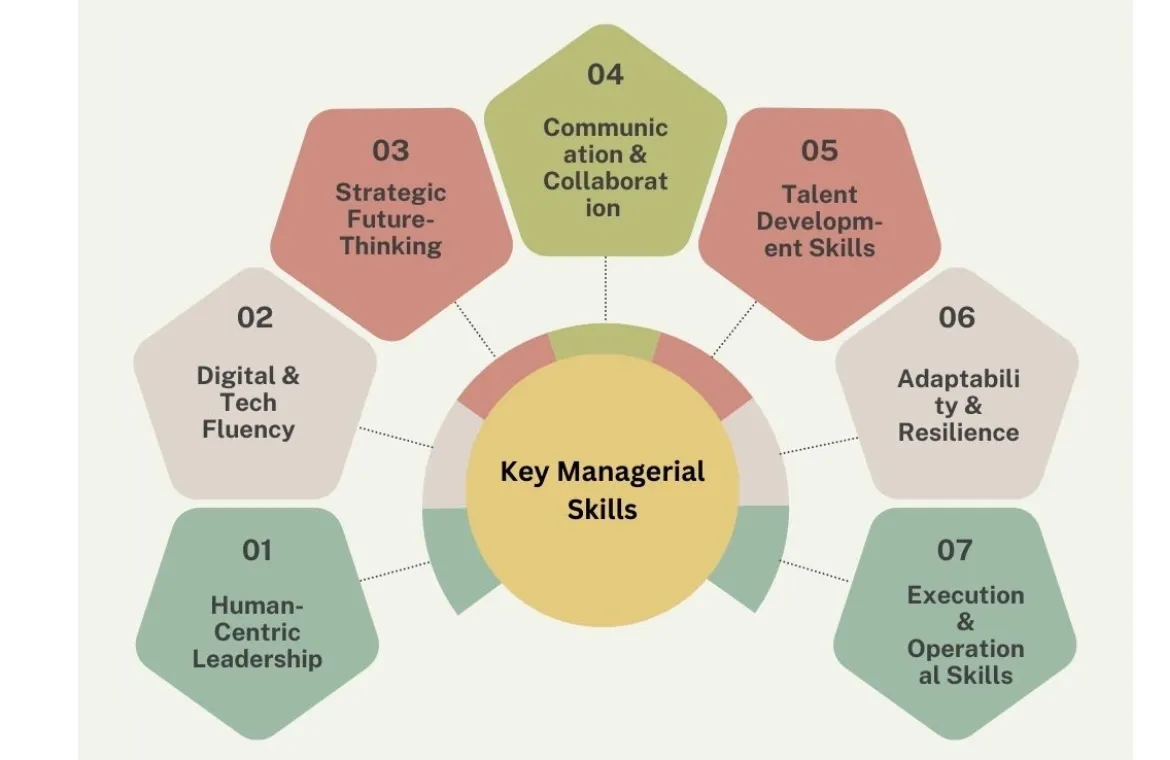The Skills Managers Will Need Most in the Next 5 Years

If you aspire to be a manager in the next five years or even if you already are one, know this: the role is changing faster than ever. Being a manager is no longer just about assigning tasks, tracking progress, or holding weekly check-ins. Imagine this: A manager who once stood at the whiteboard with a marker, delegating tasks, now finds themselves running a team that’s spread across three countries, collaborating through AI-driven platforms, and expecting more flexibility, purpose, and empathy than ever before.
The playbook for management is being rewritten. The question isn’t “Will you be ready?” but rather “Which skills will you need to thrive in this new era of leadership?”
Why Management Skills Are Evolving?
The future of management is being reshaped by the rapid digital transformation and the rise of AI-driven tools, which are changing how teams communicate and operate. At the same time, employee expectations have shifted, with today’s workforce valuing flexibility, purpose-driven work, and overall well-being more than ever.
This evolution means managers are no longer just task supervisors; they must adapt as empathetic leaders who balance advanced technology with genuine human connection. In the modern workplace, leadership evolution depends on blending innovation with emotional intelligence.
Key Skills Managers Will Need in the Next 5 Years
Workplace transformation demands managers blend human insight with tech savvy, as traditional task oversight and performance monitoring alone are no longer enough for future leadership.
Here are the essential skills that will define effective management through 2030 and beyond:
Also Read: 10 Essential Management Skills for Career Success

Human-Centric Leadership
Successful managers will champion authentic, people-first leadership that treats employees as whole individuals rather than functional resources. Human-centric leaders exhibit empathy, consideration, and transparency whilst fostering psychological safety within their teams.
Digital & Tech Fluency
Digital fluency is no longer optional it’s a must-have skill. Unlike basic digital literacy, it’s about confidently using technology to drive business growth. Many companies now expect at least half of their leaders to be digitally fluent, as tech-savvy managers understand how innovations transform customer experiences and reshape business models.
Strategic Future-Thinking
Strategic thinking means stepping back to see the bigger picture and understanding the forces that drive change. It helps managers analyse data, spot patterns, and make smarter decisions. By thinking long-term, strategic leaders navigate uncertainty and prepare their teams for the future.
Read More: What Is Strategic Management?
Communication & Collaboration Mastery
Effective communication is essential for managers not just in giving instructions, but also in listening actively, showing empathy, and reading non-verbal cues. Clear communication builds trust, reduces conflict, and creates a positive, productive workplace.
Talent Development Skills
Smart managers know talent development isn’t just HR’s job. Because they work closely with their teams, they can spot strengths, give valuable feedback, track progress, and turn learning into real results.
Adaptability & Resilience
Adaptability, the capacity to adjust effectively to change whilst achieving positive outcomes, has become particularly crucial for managers. Research identifies eight dimensions of workplace adaptability, including managing uncertainty, creative problem-solving, and crisis management.
Execution & Operational Skills
Operational excellence demands analytical skills to assess situations and identify inefficiencies. Managers require robust project management capabilities, including planning, execution, and progress monitoring. Time management, resource allocation, and budget oversight ensure operations remain within financial constraints whilst maximising productivity.
Why These Skills Matter for the Future
Understanding the importance of these management capabilities matters just as much as developing them. The skills outlined above aren't fashionable additions to your CV they represent fundamental competencies for leading effectively in tomorrow's workplace.
Managing Through Complexity
Great managers thrive in complexity by building resilience, adaptability, and perspective. With a ‘paradox mindset,’ they can hold opposing ideas without rushing to judgment sparking creativity, innovation, and confident problem-solving.
Creating Conditions for Growth
When managers invest in people, teams perform better, exceed goals, and innovate. By nurturing talent, improving processes, and balancing human–machine collaboration, they drive growth and keep organizations competitive.
Establishing Psychological Safety and Belonging
Workplace culture is key to success. A positive environment built on safety, belonging, and purpose reduces burnout, boosts retention, and drives performance. When managers live company values and communicate well, employees feel motivated, engaged, and ready to thrive.
Three Supporting Trends Managers Must Pay Attention To
Today's managers operate within a business environment shaped by three powerful forces that are redefining how work gets done. Recognising these trends and their implications for management practice is essential for developing the capabilities needed to lead effectively in the years ahead.
Hybrid and flexible work models
The physical workplace has experienced a dramatic restructuring, with only 10% of organisations maintaining fully in-office operations. More than half 55% now operate hybrid models that allow employees to divide their time between remote and office locations.
This shift delivers tangible benefits: improved work-life integration, reduced commuting stress, and enhanced job satisfaction. However, hybrid arrangements create new management challenges, including coordination difficulties across distributed teams, questions about equitable career development opportunities, and increased cybersecurity vulnerabilities that require active management attention.
AI tools and digital collaboration platforms
Digital collaboration tools have transformed teamwork, especially with remote and hybrid models. From instant messaging to video calls and file sharing, these platforms keep teams connected. Now, AI features like auto-transcriptions and smart task management are taking collaboration to the next level.
Employee focus on purpose and well-being
Perhaps most significantly for managers, employee expectations around workplace culture and personal fulfilment have shifted markedly. Organisations are responding by expanding well-being programmes beyond traditional physical health initiatives to encompass mental, financial, and social dimensions of employee welfare.
Companies that successfully connect employee work to broader purpose achieve higher rates of innovation while enjoying superior employee retention through increased engagement.
How Managers Can Start Preparing Now?
Effective preparation for tomorrow's management challenges requires action today. Here's where to focus your efforts:
Invest in Leadership Development: Join programmes offering personalized feedback and clear goals with executive coaches. These connect you with peers and alumni for ongoing support. Prioritize training in emotional intelligence, strategic foresight, and crisis management to tackle challenges early.
Build Digital Confidence: Gain hands-on experience with new technologies. Practical use boosts your ability to lead digital projects and adapt to tech-driven workplaces.
Practice Active Listening: Give full attention and show genuine understanding. This builds trust, uncovers deeper insights, and strengthens team engagement.
Strengthen Personal Resilience: Commit to resilience through clear goals, safe team environments, and leading by example. Group training accelerates learning and motivation.
Start developing now to lead effectively in a changing world. Effective preparation for tomorrow’s management challenges starts today. Proactive managers build essential skills through focused practice and strategic growth. Key areas to focus on:
Invest in Leadership Development: By joining management courses at IIM, which offer personalized feedback, clear goals, and expert coaching. These courses help you build in-demand skills like emotional intelligence, strategic foresight, and crisis management. They also connect you with peers and alumni for ongoing support.
Best of all, IIM programs often allow you to study without leaving your job, letting you earn a respected degree while continuing your career. This makes it easier to climb the career ladder and succeed as a leader in today’s complex business world.
- Build Digital Confidence: Gain hands-on experience with emerging technologies to lead digital initiatives confidently.
- Practice Active Listening: Give full attention and show true understanding. This builds trust and strengthens team engagement.
- Build Personal Resilience: Set clear goals and create safe team environments. Model resilience and join group resilience training to learn faster.
Start now to lead well amid changing demands.
Frequently Asked Questions
Q1. What are the most crucial skills for managers in the coming years?
The key skills managers will need include human-centric leadership, digital fluency, strategic thinking, communication mastery, talent development, adaptability, and operational excellence. These skills are essential for navigating complexity, fostering growth, and building a positive workplace culture.
Q2. How is the role of managers changing in modern organisations?
Managers are evolving from mere supervisors to strategic planners, problem-solvers, and change agents. They are expected to drive innovation, lead transformation initiatives, and focus more on the human aspects of leadership, such as providing empathy and inspiration to employees.
Q3. Why is digital fluency important for future managers?
Digital fluency is crucial because it enables managers to develop strategies that leverage technology for business growth. It helps them understand how digital innovations transform customer experiences and business models, which is increasingly important in today's tech-driven workplace.
Q4. How can managers prepare for future leadership challenges?
Managers can prepare by joining leadership training programmes, experimenting with digital tools, practising active listening and feedback, and building resilience habits. These actions help develop critical skills and adapt to the evolving workplace demands.
Q5. What workplace trends should managers be aware of?
Key trends include the rise of hybrid and flexible work models, the increasing use of AI tools and digital collaboration platforms, and a growing employee focus on purpose and well-being. Understanding these trends is crucial for managers to effectively lead and support their teams in the changing work environment.

TalentSprint
TalentSprint is a leading deep-tech education company. It partners with esteemed academic institutions and global corporations to offer advanced learning programs in deep-tech, management, and emerging technologies. Known for its high-impact programs co-created with think tanks and experts, TalentSprint blends academic expertise with practical industry experience.



